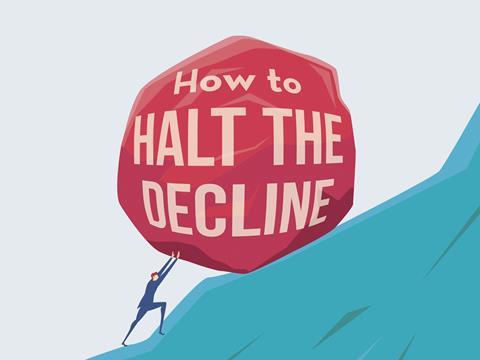Why is UK Church attendance falling, and what can we do about it? 12 leaders respond

The number of people who attend church in the UK has been steadily declining for decades. Around 30 per cent of the population were members of a church in 1930. By the year 2000, it was twelve per cent. If current trends continue, the figure will have fallen to just eight per cent by 2025.
A decade ago, most Brits (60 per cent) ticked the ‘Christian’ box when polled. However, when the results of the latest census are released this summer, Christianity is predicted to become a ‘minority’ religion for the first time, with most people no longer affiliating with the faith.
Although most pronounced among Anglican, Catholic and Methodist congregations, decline has affected nearly every denomination, and the need to reach younger generations is a pressing concern that is exercising churches across the land.
When confronted with the above statistics (and many more like them), Christian leaders sometimes highlight pockets of growth or green shoots appearing. They’ll mention churches which are doing well, or point out how Christians are reaching millions every week through amazing social action and outreach. All that may be true, and Premier Christianity takes great delight in reporting such good news stories. Nevertheless, faced with the available research, the overall picture is clear: the trend is downward.
The question of church decline is too important to ignore. If there were a silver bullet (pray more, work harder, turn the sanctuary into an amusement park) we’d have probably found it by now. So instead of sourcing one response, we’ve taken inspiration from Proverbs 11:14: “in abundance of counselors there is victory” (NASB, 1995), and asked twelve leaders, thinkers and practitioners to give their response to this most pressing of questions.

MIKE ROYAL
General secretary of Churches Together in England (CTE), Mike has been in ordained ministry for nearly 30 years. He was previously co-CEO of Cinnamon Network and the former national director of Transforming Lives for Good
Confronting the brutal facts is the first step towards stemming the tide. The Brierley Consultancy reported that church attendance between 1980 and 2015 declined from 6.4m to 3m. This is most marked in the historic churches.
Despite the steady decline, there are also signs of hope. In May 2020, The Guardian (hardly a pro-Christian newspaper) reported that “a quarter of adults in the UK had watched or listened to a religious service since the coronavirus lockdown began”.
During lockdown, we took Sanctuary Asian Fresh Expression church online and were pleasantly surprised by the level of engagement. I kept the service short and the format simple, giving people the opportunity to share communion together in their homes. It worked!
The church I attend, Lodge Road Community Church in Birmingham, kept its doors open during lockdown, providing a community café, substance abuse support groups and advocacy support for those struggling to fill out Universal Credit forms. There is anecdotal evidence of people finding faith; but they invariably found a community of belonging first.
In diverse communities where faith still underpins people’s worldview, churches are experiencing growth. Look at many black Pentecostal churches, Orthodox churches and migrant congregations. Dr Harvey Kwiyani stated at a recent Churches Together in England conference that 60 per cent of people attending church in London on any Sunday are black! The vibrant services, music, a sense of community and belonging are contributing to growth.
Hybrid services and churches where community action creates places of belonging are the way ahead. To stem the decline, services need to be vibrant and provide a sense of uplift for those who attend. Thank God for the black, Asian and migrant churches springing up in our cities, otherwise the statistics would be far worse. There’s much we can learn from them.

TOM MCLEISH
Professor of natural philosophy at University of York, a lay preacher in the Anglican Church and author of Faith and Wisdom in Science (OUP Oxford)
I wonder if this is one of those questions that assumes a false premise. I am used to them, especially the “How do you reconcile your science with your Christian faith?” one. The point being that the Church isn’t declining everywhere. Cathedrals and house churches are among the unexpected growth points. Can we learn from those places?
That science question is relevant in another way. A gospel that welcomes some human gifts and not others, that perceives our God-given talents for understanding a God-created universe as some sort of threat to orthodox faith, is not going to thrive today. A Church that reads the Bible so shallowly and disrespectfully that it demands no contextual or interpretative work in learning how to read, for example, Hebrew creation stories, will be perceived as the terrified irrelevance that it has made itself.
The confidence that knows that the gospel is transformative – not just of human individual piety and peace, but of the entire relationship we have with each other, creation and with God – is the energy that drives Church growth. That the gospel has led – historically and uniquely – to the understanding that all humans are equal, to the imperative to care for and educate all children everywhere, to pursue medical advances that heal; this radical message needs to be heard again from a Church that looks outwards.
There are creative movements within the Church that do this: Alpha, Genexis, God and the Big Bang, to name a few. None is perfect, but the habit of pouring cold water on them for their imperfections, rather than supporting them for their boldness and faithfulness, might be another answer to this question.

ANDREA WILLIAMS
Director of Christian Concern and the Christian Legal Centre
In Galatians 1:10, Paul writes: “Or do I seek to please men? For if I still pleased men, I would not be a bondservant of Christ” (NKJV). This is a message the Church needs to hear today.
I believe the Church is declining because we have forgotten how to love Jesus. We have forgotten that Jesus Christ is Lord and King, ruling over the kings of the earth.
For the past 70 years, our nation has lived off the benefits of being shaped by our Christian forefathers. We’ve enjoyed the freedom and justice that the Christian way brings, but have forgotten what it really means to say: “Christ is King”.
This has happened because the UK Church has lost her confidence that the Bible’s message is good, just and true with something to say today. Life on earth has become so cosy we have no fear of a lost eternity. We’ve abandoned teachings that feel out of sync with the thrust and comfort of our times – that we fear might be off putting to the watching world. We’ve allowed ourselves to be absorbed into the world rather than setting the standard for it. We’ve lost our zeal.
In truth, we have failed to rejoice in Christ’s truth (1 Corinthians 13:6) where it is under attack. We have failed to expose lies where they abound (Ephesians 5:11), even though this is the task of the Church in every generation.
Life on earth has become so cosy we have no fear of a lost eternity
A holy people is a happy people. Too few of us have been prepared to clearly defend the truth and beauty of God’s vision for holiness in humanity. This is a failure to love our neighbours.
Much of the Church hoped that by staying quiet, or worse, conceding on the big cultural issues of the day – sanctity of life, marriage, the uniqueness of Jesus Christ – we would forge a place for Christians within the new order. Instead we have been led adrift in the societal sickness, without a voice and unable to protect those in our care.
Every time we’ve compromised, we’ve bolstered the world’s false story about what it means to be human and abandoned the life-giving, dignifying truth that to be human is to be made in God’s image and for his glory.
It’s as if we’ve been ashamed of Jesus, when he is the lover and restorer of our souls.
But I am not ashamed. I am not afraid. As I travel and speak throughout this land, I’ve seen faith filled, thriving churches providing safe places of sanctuary, healing and hope for a broken and lost world. I’ve seen children educated, looked after in innocence, and life protected. This is the bright future of the Church.
The secular humanist agenda gripping our nation will collapse. It has unleashed death and damage: close to 10 million lives have been taken through abortion. Families and marriages have been devastated and confusion reigns in issues of sex and gender. Even now, society is beginning to realise these failures.
Churches can be countercultural communities bringing hope. Out of the ashes of a broken society will rise miracle stories of restoration that only Jesus can bring.
Church – are we ready? Ready to count the cost? Ready for gritty care of the victims of a broken society? Ready to reshape all of society according to the holiness, love, justice and purity found in Christ the King?
The message hasn’t changed. Repent and believe the good news. Dry bones, hear the word of the Lord and live.

BISHOP JILL DUFF
Bishop of Lancaster, former director of St Mellitus College and author of the forthcoming book Lighting the Beacons (SPCK)
The British Isles has an incredible spiritual inheritance. We have short memories. We think we live at the critical moment in time. But our story is not inevitable decline. The Christian faith has waxed and waned over history.
Church attendance grew after the national trauma of the Second World War, in the late 1940s and early 50s. Why? Research suggests it was not because of great bishops or church leaders, but because people were able to hear the gospel in their own everyday language, thanks to the work of writers and artists such as Dorothy Sayers, Simone Weil and, most famously, C.S. Lewis.
The Holy Spirit comes where he is Lord. He stays where his fire is welcomed, where he is taken at his word. Jesus didn’t spend much time with the proud or cynical. He spent time with the humble poor who knew they needed to turn their lives around. In his manifesto sermon recorded in Luke 4, Jesus quotes from Isaiah 61, making it clear that it would be the poor, the broken-hearted, the captives and the prisoners who would “renew the ruined cities that have been devastated for generations” (v1-4).
Who is missing from many of our church congregations and leadership? Would Peter, the rock on which Jesus built his Church, find his way easily into today’s church leadership? The unschooled fisherman, whose apprenticeship was served not at university, but in the school of hard knocks.
Less ego, more room for God – that’s my experience in training and overseeing church leaders. We can excuse church decline by saying we live in a post-modern, secular world. Really? If nothing else, the last two years of the pandemic have pointed to a spiritual awakening. People are facing death and reaching for answers to the big questions in life.
The last two years of the pandemic have pointed to a spiritual awakening
In Lancashire, the pandemic has been tough. We have had the highest rates of lockdown in the country. But our leaders have been agile and courageous. We are seeing a bounce-back which reaches people beyond our previous congregations; an immense creativity online; an acceleration in relationships with councils and communities.
In the wake of our national trauma after the pandemic, I am praying for writers, artists and musicians to use their gifts with fresh courage and verve. I am praying for churches to continue springing up on our poorest council estates and devastated urban areas, where egos are small and people are hungry for God.
In short, I am praying for beacons. For us to forget our fears and to look for Jesus’ gift of giant faith, honed in the school of following him to the cross; to find our tongues released by the Spirit, so we can naturally speak about the wonders of God in a language that our colleagues, our families, our friends can understand. God’s Spirit is wonderfully creative. And he “is able to do immeasurably more than all we can ask or imagine” (Ephesians 3:20).
It is the longing in the heart of God for everyone across our nation to get the chance to hear the heart beat of the father who is missing his long lost sons and daughters, longing for them to come back home.
Let’s ask the Lord to call out workers with the courage of lions, who are prepared to search for our lost brothers and sisters in the wilderness and bring them home, to his fiery hearth of love, safe at last.

PROF ROBERT BECKFORD
Scholar-activist researching the intersections of faith and racial justice. A BAFTA award winning documentary filmmaker, his latest work is After the Flood, which premieres on 25 May (see mjr-uk.com)
The Church has declined because it hasn’t decolonised. It has failed to develop the kind of radical inclusivity that signals a commitment to a gospel of love and justice, and therefore, it has presented a very weak witness to the world on what it means to be children of God. It is a tragedy that dance floors on Saturday nights are inclusive, while Sunday mornings in churches are apartheid. This is because an opportunity was missed during the 1950s, with the Windrush generation, to absorb culturally diverse people into the Church – in all the major denominations.
The second reason is the lack of prophetic witness and speaking truth to power on a regular and consistent basis. I would argue there’s been more prophetic acumen in MPs David Lammy, Diane Abbott and Dawn Butler than all of the archbishops of Canterburys put together when it comes to issues of racial justice and social inclusion. More books have been written by English Christian theologians about animals than on the subject of racial justice.
Because of the lack of decolonisation and prophetic witness, there’s been a failure to produce a radical counterculture that people can engage with. I’m talking about an economy that isn’t based on capitalist exploitation. We need a genuine alternative. But in environmentalism we’re playing catch-up to Extinction Rebellion and Just Stop Oil. My LGBT friends tell me that the UN has a more dynamic understanding of what it means to be human than the Church does.
Christian theology in Britain is an apartheid discipline
When I was a student in North America in the 1980s, I had friends who never bought any new clothes. There were churches who were into recycling before they knew what the word meant. I didn’t know what a car-share was until my Mennonite friends told me that they had one car between eight families. It was a radical counterculture, and it was relatively easy to secrete people into that and feel like: I’m in the kingdom now.
Here’s the good news. All we need is one of those really wealthy Christian people to give half a million pounds to a new centre for intercultural theology for the future of Britain, which can help address these issues and train clergy. If you don’t want to be prophetic because that’s risky, then at least support the people who will be. Because Christian theology in Britain is an apartheid discipline. You’ve got maybe 500 people teaching theology in the university system and only two and a half of those full-time teachers are black. The consequence is that we are training a whole new generation to live within the status quo. The whole system is in crisis, and not willing to ask the hard questions.
Here’s the question for the Black Church: can you survive with only six per cent of your clergy trained? Within one generation, their children are going to be saying: “That doesn’t make sense.” We attempted to engage with it when I taught in Kent. We set up a project and trained 100 African clergy and gave them degrees in theology. The university cut it. They couldn’t get the funding.
I’m not just a cynic. I’m a Pentecostal, so I have to come up with hope. I’ve just made a film with the Movement for Justice and Reconciliation called After the Flood: Christianity, slavery and reconciliation. It’s the first documentary in Britain about how the Church became engaged in a racist discourse – not just in terms of slavery and colonialism but, before that, in terms of the Church Fathers buying into this negative view of blackness. But the film also looks at how the Church can get itself out of this. If we can understand that story, it’s one of the ways ahead. It’s not rocket science. The problem is always about power. Christ devoids himself of power for redemption. But churches are unwilling to do that.

DR KATIE GADDINI
Sociologist at University College London. Dr Gaddini previously worked in the prevention of gender-based violence in Peru, South Africa, Spain, and the US. She is the author of The Struggle to Stay: Why single evangelical women are leaving the Church (Columbia University Press)
Single women have kept churches in the UK afloat for decades. So when I discovered this group are the most likely to disaffiliate from Christianity, I was concerned. And I wondered what was taking place.
The answer, it turns out, is complex. Over the years, I’ve met many different types of single Christian women: some live in urban centres, such as London, and others in small towns. They range in age and come from an array of Christian denominations. Despite all of this, similarities cut across many of their differences. In my book, I focus on four main types of single Christian women. It’s worth saying that there are single Christian women who are happy in the Church and hold very few grievances. But they are a minority. Most fall into one of profiles below:
The Remainer persists in her commitment to the Church and her desire to make it a more equitable place for women. Although she harbours frustrations and disappointments with the way single women are treated, she desires to change the institution from the inside. She may aspire to a leadership role, though not always; more so, she just wants to be accepted as she is, to be valued on her own terms, without a husband by her side. She has a close-knit group of single female friends who sustain her, and who she considers her community. She desires marriage and motherhood, though may be disillusioned with dating in the Church – especially the lack of options, given the imbalanced ratio of women to men.
The Drifter comes late to Sunday services and leaves early. She lingers at the back of the church sanctuary and knows very few people. Some Sundays she skips church altogether, lacking the confidence to show up. This type of single Christian woman often feels invisible and out of place in church anyway, especially at services full of married couples and children, so her outward behaviour begins to match her inward feelings. You’re more likely to find The Drifter among women of colour and working-class women, whose intersecting identities of marginalisation increase the exclusion they feel in the Christian community.
The Doubter (no longer attending church) remains on the outside of church life, though she still believes many of the core tenets of Christianity. Her relationship with God remains strong, and she is adamant about separating the Church, as a body of fallible believers, from Jesus. She doesn’t doubt the Bible itself, she doubts the way the Bible has been interpreted by fellow Christians. She may struggle with a pastor’s complementarian theology, or her church’s view on LGBT issues. Alternatively, experiences of sexual misconduct in the Church may precipitate doubts, causing her to distrust it as an institution, even as she holds tight to her Christian beliefs. She’s got one foot in and one foot out, and she may remain in this place for a long time.
It’s time leaders started addressing systemic misogyny and valuing women as equal members of the body of Christ
The Apostate is a single Christian woman you are unlikely to meet at church, because she does not attend anymore. In fact, she doesn’t even call herself a Christian, or believe the tenets of Christianity. Single women reach this point when they’ve finally snapped, meaning their wounds and grievances with the Church have reached a breaking point. A snap is a word that invokes action; it’s also a word that connotes irrevocability, meaning you don’t come back from it. Although it may seem like one single event or encounter causes The Apostate woman to abandon her faith, it’s actually the accrual of years of feeling that she doesn’t belong, she doesn’t fit, she isn’t valued. In the words of one 30-something woman I met: “It’s like I am in ‘third place’ in the Church hierarchy, far behind the married people and the kids.”
Maybe it’s finally time that leaders started listening to the concerns of single Christian women, addressing systemic misogyny, classism and racism, and valuing women as equal members of the body of Christ.

TIM HUGHES
Worship leader and pastor of Gas Street Church, Birmingham.
Just over six years ago my wife, Rachel, and I relocated to Birmingham to plant a city-centre church called Gas Street. Against a backdrop of church decline, we’ve seen hundreds of predominantly young people say: “Yes!” to Jesus and have had the joy of planting five churches, seeing leaders raised up and sent out.
At our launch, the Bishop of Birmingham, David Urquhart, laid down a charge that we would be a church for the uncomfortable. He urged us to never settle or play it safe. A comfortable church will always be in decline. A church focused on its own interests, turned in on itself, overly focused on theological divisions, personality differences, styles of worship or unnecessary building projects will fail in its crucial calling to “go”. We are to be called out in the Missio Dei of seeing those who are lost saved (Luke 19:10). Our mandate is to be salt and light; to live lives of radical love, generosity and care, empowered by the Spirit of God. Our choices and way of living should always challenge others.
I was deeply impacted by the words of Ben Sixsmith, writing in The Spectator: “I am not religious, so it is not my place to dictate to Christians what they should and should not believe. Still, if someone has a faith worth following, I feel that their beliefs should make me feel uncomfortable for not doing so. If they share 90 per cent of my lifestyle and values, then there is nothing especially inspiring about them. Instead of making me want to become more like them, it looks very much as if they want to become more like me.”
It’s time for hope
Ouch! I believe we need to move from a preservation mindset, eager to stay culturally relevant, to one of bold expectation. I see many pastors and teachers in the Church, but I believe we need more prophets and apostles. Prophets who will challenge and confront, who will call the Church to holiness. Apostles who will pioneer, mobilising believers and taking great risks.
Our experience at Gas Street has been that, as we’ve worshipped Jesus with great passion and devotion, as we’ve sought to be led by the Holy Spirit, as we’ve challenged people to grow in confidence in what God can do in and through them, we’ve seen salvation. We’ve seen signs of the kingdom of God advancing.
Leading a church has been the hardest thing Rachel and I have ever done. Leading in our current context and culture is hugely challenging. I’m acutely aware that I don’t have the answers to many of the profound questions being asked. But the one thing I’ve tried to maintain is a childlike faith. Sometimes, if I’m honest, I wonder if it seems a little naive, but I’m determined to live my life in the expectation that I will see the goodness of God in the land of the living. It’s time for hope. It’s time for an uncomfortable Church!

VICTORIA TURNER
PhD candidate at the Centre for the Study of World Christianity and editor of Young, Woke and Christian: Words from a missing generation (SCM Press)
The fluid lifestyles of young people, who tend to be highly mobile, coupled with the postmodern tendency to be disillusioned with organisations and institutions does not suit the model of the rigid Church we often have today.
There is a culture of suspicion of institutions that usually only make mainstream news because of racism or denial of trans / same-sex relational rights – issues that young people tend to be very passionate about. There is a lack of understanding about young people’s real commitment to these justice issues that they see as integrally aligned to the gospel. Young people become disillusioned with structures that seem to act against what they preach.
There is a need to truly integrate young people into church structures or leadership positions to enable them to influence positive cultural change rather than continue to concentrate on capitalistic marketing schemes to attract more young people. A concentration on economic growth in a neo-capitalistic environment that turns people into figures should not be the goal of the Church but, instead, the Church’s service to the world in witness to Christ should be central. This begins by revealing and loving the community of the Church that is already there.

NATALIE WILLIAMS
Chief executive of Jubilee+. Her latest book, co-authored with Paul Brown, is Invisible Divides (SPCK)
I grew up in relative poverty in Hastings, a wonderful but deprived seaside town that a national newspaper once called “Hell-on-Sea”. I’m from a working class family and, when I started going to church as a teenager, it wasn’t because I was on a deep spiritual quest for absolute truth. It was because I liked a boy.
But God had other ideas. By his mercy, I became a Christian. This was quite a shock to me. I didn’t know much about the Bible or church. I suddenly found myself in an unfamiliar world…this wasn’t just a spiritual shock, but also a culture shock relating to class. The majority of my church were middle class and behaved in ways I did not understand and had not seen before.
Lovely Christians started inviting me for dinner, but I’d never seen food served the way they served it. There were lots of other differences too, touching on values, attitudes and behaviours connected to communication, authority, money, community, aspirations and even faith.
I felt like I didn’t fit in. To be honest, even though I’ve been a Christian for nearly 30 years and have been on the leadership team in my church for ten, I often still feel like I don’t fit in.
Over the years, I’ve seen people of similar and tougher backgrounds to mine come to faith in Jesus, get baptised and then promptly disappear from church life within six months. There are all sorts of reasons for this, but undoubtedly one of them is that most British churches are very middle class, leading those who aren’t to sometimes feel alienated, excluded and even offended.
Revival typically comes through those who live in poverty
When Paul Brown and I were writing our book on class issues in British churches, several people told us we were making a big deal about something that isn’t an issue. But the only people who said that to us were middle class. On the flipside, those from a working-class background thanked us. People we didn’t know got in touch via social media to tell us how needed the book is.
According to the British Social Attitudes Survey, 60 per cent of people in Britain identify as working class. This percentage has not changed since 1983. Of those who call themselves working class, 82 per cent believe there is a “wide divide” between the classes.
In the past, when revival has come to our nation, it’s typically come through those who live in poverty or who are working class. It rarely trickles down. It usually starts on the ground and spreads up.
If we want to see revival in our nation, we need to humble ourselves and be much more proactive in reaching out to those who might not be like the majority in our churches. By ‘reaching out’, I mean mixing and becoming genuine friends with,loving, caring for and learning from people who are different to us; whose life experiences don’t mirror our own.
That’s the beauty of the Church, isn’t it? That people from all walks of life stand shoulder-to-shoulder. We are meant to display a unity that draws a watching world to Jesus. No one marvels at unity among a group of like-minded people. The only unity that causes wonder is a unity among diversity. Our churches should be full of people who would never naturally mix but are united in their love of Jesus. When we recapture God’s vision for the Church, maybe then we’ll see revival.

CALVIN ROBINSON
GB News presenter and Anglican ordinand
The Church is losing sheep because the shepherds have lost their way. The very people who are supposed to lead us have lost all sense of direction.
The Church as an institution has become increasingly liberal, attempting to chase societal norms, instead of offering an alternative option to an increasingly godless society. We recently saw the former Archbishop of Canterbury, Rowan Williams, sign a letter stating: “To be trans is to enter a sacred journey of becoming whole”. It was a weak, gnostic excuse for Christology.
That letter also included the statement: “Every church should be a safe space that affirms people in being who they are, without fear of judgement.” But this is antithetical to the faith. The Church is not a space for us to affirm who we are; it is a place for who we are to be changed through an experience with Jesus Christ. Nor are churches supposed to be free from fear of judgement; it is a minister’s job to portray the fear of God and preach about the coming judgement of our Lord (Acts 17:31; John 12:47- 48; Ezekiel 7:3; Matthew 25:46; 2 Timothy 4). As we say in the Creeds, the Lord will come to “judge both the quick and the dead”.
The solution is straightforward: we must return the Church to God. With Jesus Christ as the head of the Church and the Faithful as the body, together we should remain rooted in the faith. To do that, we must return to the Bible – the word of God – and remember the primacy of scripture.
We are all fallen and, therefore, we all make mistakes. Perhaps it is time we help the increasingly bureaucratic leadership of the Established Church back on track by reminding them that they are not managers or politicians, they are prophets, teachers and evangelists; called to preach the gospel and make disciples, not follow the latest societal trends.

GAVIN CALVER
CEO of the Evangelical Alliance
As we head out of the worst of this pandemic, the old trope that the Church is dying has re-emerged with stories about the terminal decline of the Church in the UK. Yes, things are challenging, there is, however, also much reason for hope. In church buildings and school halls, in warehouses and homes, on playing fields and over garden fences, Christians all over the nation are innovating, gathering to worship together, sharing their faith, feeding the poor and caring for the stranger. The pandemic has had a huge impact on us all, but I don’t believe that it has caused an existential crisis in the Church. Quite the opposite is true for many. It has woken so many of us up to what’s possible, who we should be among and why it is that we exist.
Effective evangelism is the only way to see things turn around
Throughout the pandemic the Church has transformed itself to serve the needs of our communities in new ways. Just a few years ago, the idea of online church would have seemed a far-fetched concept and yet today it is standard practice. We don’t fully know the numbers engaging online, but I believe that technology is part of the answer when it comes to moving forward. Our message is now more accessible than ever!
We need to be witnesses where we are. This makes every street a parish and every garden fence a pulpit. This adaptable model has a far better chance of reaching new people with our message. In the end, the only real way to turn around decline is for many new people to surrender their lives to Jesus. Effective evangelism in a post-pandemic world is the only real way to see things turn around. We must prioritise reaching those outside of the Church who are looking for hope after such a hopeless season.

DOMINIC DE SOUZA
Senior leader at City Church Cardiff and a member of the Elim National Leadership Team
Part of the decline may be explained by the fact that nominal Christians are becoming increasingly uncomfortable in donning the colours of Christianity. The tectonic plates of culture have shifted significantly and there’s no longer any cultural advantage in self-identifying as a Christian. Nevertheless, the overall trend is clear: the Church in the UK is in decline.
The pandemic seems to have accelerated this haemorrhaging, but there are many other contributing factors too: from the Church’s credibility taking a nosedive in light of scandals to ageing congregations that are not being replaced by younger ones, to negative perceptions on the street which have put us on the seemingly wrong side of the cultural war.
But facts are our friends, and acknowledging the decline is the first step towards reversal and recovery. From here we can pray informed prayers and develop strategies such as investing in outreach and ministry to the younger generations, teaching more robust apologetics that can better equip our people to withstand cultural assaults and strengthening our justice, compassion and community ministries to demonstrate the love of God to a hurting world.
Overseas missionaries are instinctively aware of the need for contextualising or adapting their missional methods; the statistics suggest that this nation is now like an international mission field in a non Christian country – so church leaders today would do well to adopt a similarly missionary mindset to help us face the new realities before us.
The numbers are a sobering reminder that there are substantial challenges ahead – but history has shown that it is often in such times of difficulty that the Church has been at her strongest. Let’s recognise that our biblically illiterate but spiritually hungry generation is still to discover what authentic Christianity is. And empowered by the Spirit, may we commit to renewed mission and take the whole gospel to the whole nation.































